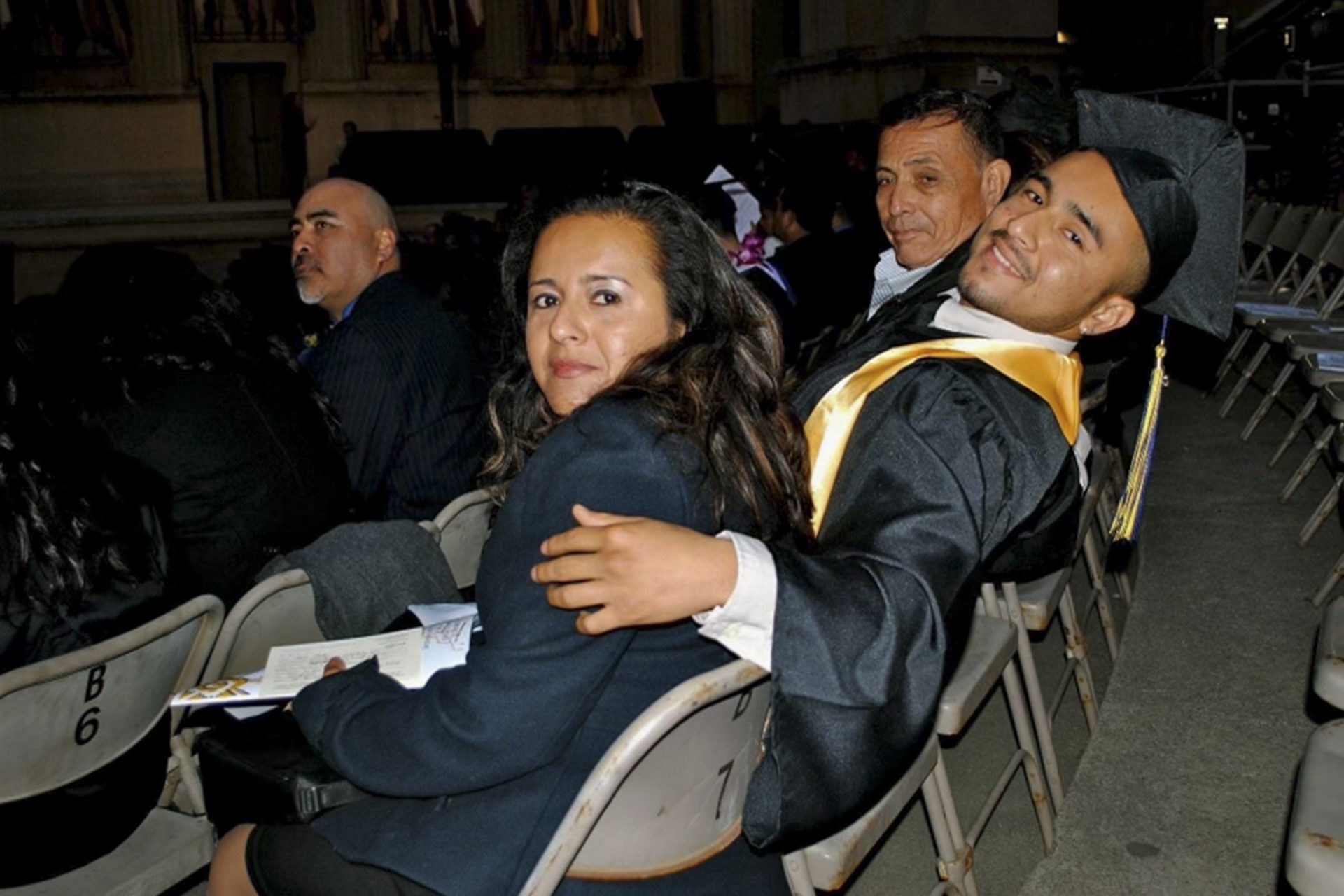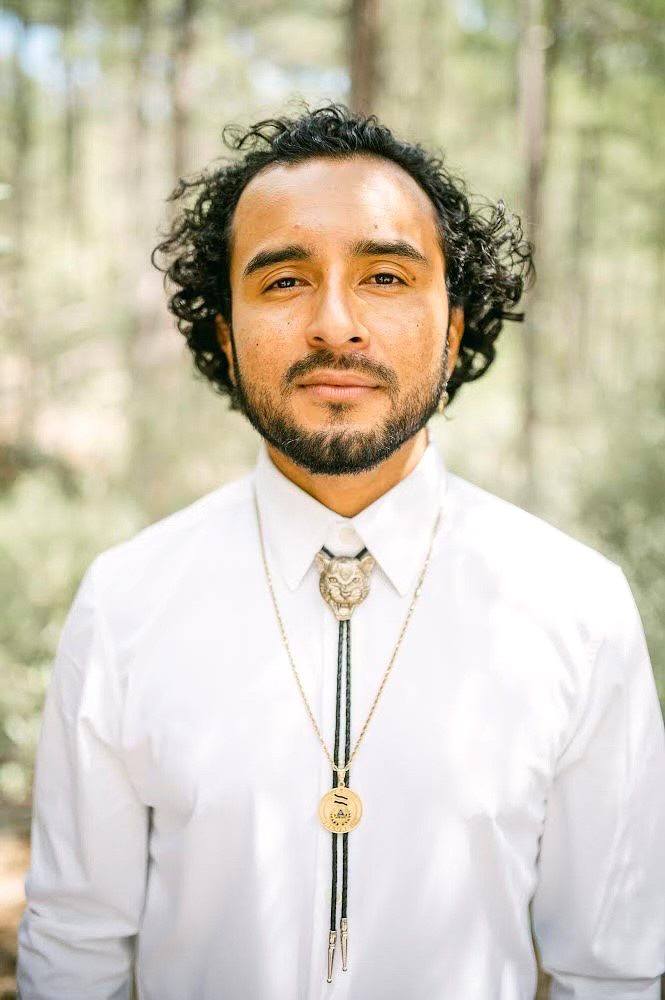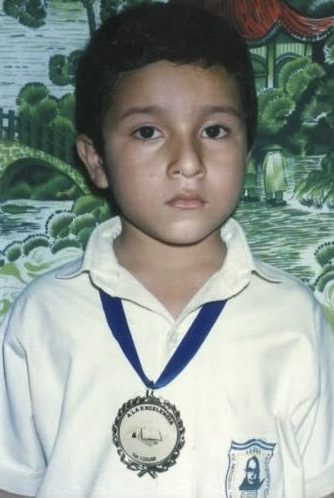 Foto cortesía de Javier Zamora
Foto cortesía de Javier ZamoraEl poeta Javier Zamora emprendió de niño un viaje de tres mil millas desde El Salvador a Estados Unidos para reunirse con sus padres.
Cuando Javier Zamora tenía nueve años, abandonó su pequeño pueblo de El Salvador y emprendió un viaje de tres mil millas hacia el norte para reunirse con su madre y su padre en Estados Unidos. Viajando con un grupo de desconocidos y un "coyote", Zamora recorrió en camión, barco y a pie Guatemala y México para cruzar la frontera estadounidense.
Noticias que ponen el poder en el punto de mira y a las comunidades en el centro.
Suscríbase a nuestro boletín gratuito y reciba actualizaciones dos veces por semana.
Zamora relata ese traicionero viaje de dos meses en sus nuevas memorias, "Solitoque ya es un bestseller del New York Times.
"Este es el viaje mítico de nuestra era, narrado por un héroe que no tiene edad ni para atarse los zapatos, un oráculo para nuestros tiempos turbulentos", escribió Sandra Cisneros, autora de "La casa en Mango Street", sobre el fascinante libro de Zamora.
Como miles de jóvenes cada año, Zamora abandonó su hogar para buscar una vida más segura con su familia en Estados Unidos. Casi 130.000 "menores no acompañados" - personas menores de 18 años que llegan a Estados Unidos sin un progenitor o tutor y sin un estatus migratorio legal- entraron en el sistema federal de albergues de Estados Unidos en el año fiscal 2022, una cifra sin precedentes. Los padres de Zamora habían abandonado El Salvador y llegado a Estados Unidos años antes que él debido a la guerra civil salvadoreña financiada por Estados Unidos.

En este extracto, Zamora relata cómo camina por el desierto mexicano después de que unos soldados mexicanos detuvieran su autobús en un puesto de control. Los soldados, sus grandes botas negras y sus largas armas aterrorizan al joven Zamora. Tras obligar al grupo de Zamora a tumbarse en el suelo y alejar el autobús, la policía les quita el dinero y los deja en la carretera.
Caminamos desde el mediodía. Una de la tarde. Dos de la tarde. Vigilamos a la policía y a los soldados que se acercan por la carretera. No es la carretera principal por la que íbamos, es otra ruta, menos coches, menos pueblos, dice Coyote. Llevamos horas en esta carretera. Sigue siendo de asfalto, pero hay tierra a ambos lados, cactus, arbustos, pero no hay árboles para dar sombra.
Si se acercan policías o soldados, huimos de la carretera y nos escondemos entre la maleza. Gritamos "¡Escóndete!" si viene algún vehículo por delante o por detrás. Marcelo camina hacia atrás, mirando a todas partes. Luego Chino le quita el puesto a Marcelo. Luego Chele. Si no son policías ni soldados, Coyote saca el pulgar como en los dibujos animados, dice que eso es lo más seguro, que él saque el pulgar y nosotros salgamos corriendo a escondernos.
Coyote pregunta si hablamos mientras subimos al autobús, si hablamos en la terminal. Nadie dice nada. Nos dice que siempre, siempre tengamos puesto nuestro acento mexicano. "¿Saben qué? Mantened la puta boca cerrada. Ahora casi no tenéis dinero". Nos explica que ha hecho esto mil veces. Que es culpa nuestra que andemos. Que le dejemos ser nuestra boca.
Todavía no nos ha dicho su nombre. No nos dice mucho, salvo que es mexicano, pero no del sur "de mierda" de México donde estamos. Llevamos horas caminando. Nadie se ha detenido. Hace mucho calor bajo el sol. Más calor aún en el asfalto; sentimos que nuestros zapatos se derriten. Nos quitamos la ropa bonita; Patricia pensó que era inteligente ponernos la ropa mojada, la que lavó para mí. Nos refresca un poco, pero ahora volvemos a tener calor. Estamos sudando como cuando estábamos tirados en la tierra. Las armas. Sus manos.
El plan es hacer que un coche se detenga para llevarnos. Tiene que funcionar. Coyote dice que Los Botas se llevaron la mayor parte de nuestro dinero. Que tuvo que dárselo a ellos. Que por eso no podemos pagar otro autobús. Debemos ahorrar.
Coyote dice que el Sr. Dólares metió la pata, que "la cagó". Que Los Botas sólo quieren asustar a la gente y que en realidad no quieren deportarnos. "Demasiado papeleo".
"Por eso escondes tu dinero donde nadie mire. Todo lo que quieren es un pequeño mordisco".
Incluso yo recuerdo a Don Dago diciéndonos que no guardáramos el dinero en los zapatos, ni en los bolsillos, ni en los calcetines. O que hiciéramos doble calceta y escondiéramos el dinero entre los calcetines.
"Cipotillo, no te preocupes", me dice Chele mientras caminamos. Está sudando, respira con dificultad. Cipotillo es como ha decidido llamarme. Nunca nadie me había llamado así. "Somos del único país del mundo que lleva el nombre de Dios. Piénsalo".
No sabía que Chele fuera religioso.
"Cabal, es una buena señal". Chino le apoya.
"Así que eso significa que Él nos ayudará a llegar a ¡Los Estamos Unidos!"
Chele grita la última parte.
No hay coches, ni más gente que nosotros. Nadie le dice nada.
Los Estamos Unidos. Eso me gusta. Es a donde vamos. Juntos. A estar con nuestras familias. La última vez que hablé con mis padres en Tecún fue cuando los llamó el abuelo. Ninguno de nosotros ha llamado al norte. Cuando el abuelo se fue, fue el último día que hablé con alguien: Abuelita, Mali, Lupe, mamá, papá. Los extraño a todos.
¡A Los Estamos Unidos! Quiero gritarlo como hizo Chele. Pero me limito a seguir a todos. Caminamos hasta que nuestras piernas dicen "no más" y Coyote dice: "Descansa, alguien parará".
"Ya hemos sufrido bastante por hoy", añade Patricia.
Así que nos escondemos entre los arbustos junto a la carretera mientras nuestro Capitán Coyote saca el pulgar. Todos nos reunimos alrededor de Marcelo, que comienza a explicar lo que faak significa. Cada vez que un coche frena pero sigue circulando, Marcelo grita: "¡Faaaak!". Nadie conoce la palabra.
"Es inglés", dice Marcelo. Nos cuenta cómo es vivir en Los Ángeles, donde vivía antes de que lo devolvieran a El Salvador. Que él no quería volver, pero los gringos lo atraparon. No sé qué significa eso, pero nadie pregunta.
El abuelo tenía razón. La gente del pueblo dice que Marcelo no volvió porque quiso. "Pero allí arriba aprendí algunos Inglés". Todos tienen los ojos clavados en él mientras habla. Luego dice: "La USA es el mejor país, mejor que cualquiera en el que hayamos estado". Se inclina más hacia mí.
"El mejor país, Chepito".
Es mi oportunidad, así que le pregunto si lo que he oído es cierto. "¿Hay pizza durante el almuerzo en la escuela? ¿Comen los niños hamburguesas a todas horas? ¿Están las calles limpias y con McDonald's por todas partes? ¿Es la playa azul y ancha como en Baywatch?"
Dice sí, sí, sí y sí. Todo el mundo sonríe.
"Vale, pero dinos qué faak significa", dice Patricia.
"Es una mala palabra".
"Dilo", le empuja Patricia.
"Los niños". Nos hace un gesto con la cabeza, luego se inclina más hacia ella y se lo susurra.
Se sonroja y sus ojos se agrandan.
Todos se ríen.
Otro coche aminora la marcha pero no se detiene. "¡Faak!" dice Marcelo.
"¡Faak!" grita Patricia.
Luego Chino. Luego todos en Los Seis dicen lo mismo: "¡Faaaak!". Gritamos desde las entrañas. Por nuestras gargantas. Por nuestras bocas abiertas de par en par. No podemos parar de reír. Todavía no sé lo que significa. Primero, esperaba que los coches pararan. Ahora, una parte de mí espera que sigan conduciendo para que sigamos gritando: "¡FAAAAKKKK!"

En es se hace tarde. No anochece, pero casi. Coyote tiene una idea. "La gente quiere ayudar a una madre y sus hijos, ¿no?"
"Puesí".
"Cabal".
Unos minutos más tarde, somos Patricia, Carla y yo junto a Coyote esperando que alguien pare. Estamos quemadas por el sol. Se nos está acabando el agua. Nos hemos comido todos los bocadillos que compramos en la terminal. Las suelas de nuestros zapatos están calientes como brasas.
Entonces se acerca un microbús gris claro.
"¿Adónde va?", pregunta el conductor.
"Donde quiera que estés, jefe", dice Coyote, mirándonos para asegurarse de que no decimos nada.
"¿Cuántos?"
"Seis más yo".
El conductor golpea el volante con todos los dedos. Mira más allá del parabrisas, luego mueve la cabeza como si fuera una cola. "Sube. No querrás estar aquí de noche".
Patricia suelta un suspiro. Yo sonrío. Carla sonríe. Coyote saluda a Marcelo, Chino y Chele, que se levantan de entre los arbustos.
"Son inofensivos", le dice Coyote al conductor, asegurándose de que Patricia, Carla y yo ya estamos en el microbús, con la mano sujetando la puerta abierta.
Los hombres suben al interior. Sólo hay otra persona, en el asiento del pasajero. ¿Un cliente? ¿El hermano del conductor? El conductor no dice nada, pero el pasajero también lleva una mochila.
"Vamos a Acapulco, ¿está bien?"
"Órale", dice Coyote.
Acapulco. Conozco ese lugar. Me siento en la última fila, en el regazo de Patricia. Carla a mi lado. Chino junto a ella. Los otros hombres comparten la fila del medio.
No hay aire acondicionado. El conductor baja todas las ventanillas para que corra el aire por el microbús. Chino abre las ventanas triangulares de atrás. Son pequeñas y sólo entra algo de viento, pero es mejor que esconderse entre la maleza.
"Descansad", dice Coyote, girándose para mirarnos a Carla y a mí en particular. Todavía no nos ha dicho su nombre. "Estamos a salvo", dice, con la voz todavía un poco ronca. Lleva así todo el día, desde que nos gritó cuando todos los de los barcos se duchaban o iban al baño. "Tres minutos", aún puedo oírle decir.
"Estamos a salvo, descansa", repite. Nadie dice nada. El conductor enciende la radio. Son Los Temerarios, "Como Te Recuerdo". Me encanta esta canción. A Mali le encanta esta canción. A Abuelita le encanta. La apertura es tan suave, tranquila. Y luego aumenta en velocidad, en sonido, y es como si estallaran fuegos artificiales antes... Como te recuerdo, amor. Si tú supieras cuánto te extraño . . .
La brisa entra por la rendija de la ventana. Echo de menos mi hogar. A mi familia. Quiero dormir. Intento cerrar los ojos. Esto es México. Estamos conduciendo hacia Acapulco. El sol es un punto en el cielo, el mismo sol que vi salir hoy en esa hermosa playa. Parece que fue hace días. Los barcos, los soldados, el paseo, los peces voladores, la playa, los camiones, la ducha, los tres minutos.
Extraído de Solito de Javier Zamora. Copyright © 2022 por Claudia Fleming. Extraído con permiso de Hogarth, un sello y división de Penguin Random House LLC. Todos los derechos reservados. Ninguna parte de este extracto puede ser reproducida o reimpresa sin el permiso por escrito de la editorial.
Utilizando nuestro enlace de afiliación para comprar libros a través de Bookshop.org una parte de los beneficios se destina a apoyar el trabajo de Borderless Magazine.

